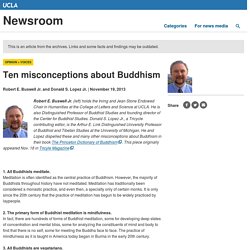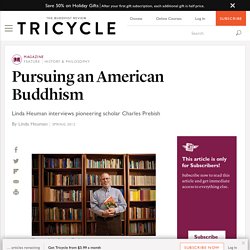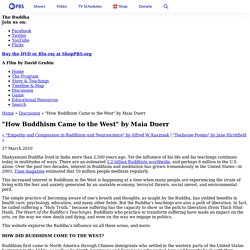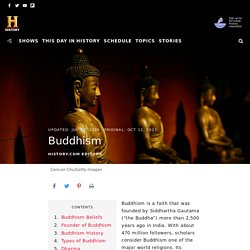

Practicing Buddhism in daily life. Ten misconceptions about Buddhism. Robert E.

Buswell Jr. and Donald S. Lopez Jr. | November 19, 2013 Robert E. Buswell Jr. (left) holds the Irving and Jean Stone Endowed Chair in Humanities at the College of Letters and Science at UCLA. 1. Meditation is often identified as the central practice of Buddhism. 2. In fact, there are hundreds of forms of Buddhist meditation, some for developing deep states of concentration and mental bliss, some for analyzing the constituents of mind and body to find that there is no self, some for meeting the Buddha face to face. 3. Bhikṣu, the Sanskrit term translated as "monk," literally means "beggar. " 4. It is often said that a war has never been fought in the name of Buddhism. 5. Buddhism has many philosophical schools, with a sophistication equal to that of any philosophical school that developed in Europe. Pursuing an American Buddhism. Charles Prebish has probably visited more American dharma centers than anyone else on the continent.

For those familiar with his work, this should be no surprise, as Prebish pioneered the scholarly study of American Buddhism as a subdiscipline of Buddhist studies. In the late sixties and early seventies, when Prebish was beginning his career, the academic study of Buddhism meant largely its study as an artifact of “Oriental” culture. As a young scholar Prebish focused on early Indian Buddhism: the development of the monastic system and the disciplinary literature known as Vinaya, topics well within the range of traditional Buddhist studies scholarship. But by the seventies, Prebish was among the first academics to observe that the burgeoning importation of Buddhism to the United States was developing its own cultural face, one that itself was worthy of observation and study. —Linda Heuman Do we really have an American Buddhism yet? Americans tend to be impatient. "How Buddhism Came to the West" by Maia Duerr. Shakyamuni Buddha lived in India more than 2,500 years ago.

Yet the influence of his life and his teachings continues today in multitudes of ways. There are an estimated 1.2 billion Buddhists worldwide, and perhaps 6 million in the U.S. alone. Over the past two decades, interest in Buddhism and meditation has grown tremendously in the United States—in 2003, Time magazine estimated that 10 million people meditate regularly. This increased interest in Buddhism in the West is happening at a time when many people are experiencing the strain of living with the fear and anxiety generated by an unstable economy, terrorist threats, social unrest, and environmental peril. The simple practice of becoming aware of one’s breath and thoughts, as taught by the Buddha, has yielded benefits in health care, psychology, education, and many other fields.
This website explores the Buddha’s influence on all these areas, and more. Dalai Lama's guide to happiness. The Buddhist Perspective on Human Fulfillment: The Pure Land. By Alfred Bloom, Emeritus Professor, University of Hawaii Every major religion of salvation has a vision of paradise, the destination of the faithful.

In the early tradition of Buddhism the goal was inconceivable Nirvana. Nirvana as a term meant to blow out, that is, blowing out or extinction of the winds of passions, delusion and greed; transcendence of karma. It was not a place to go, but more a state of being or condition beyond description or conception. The Buddha, upon his enlightenment, attained partial Nirvana because he willed to stay in the world to share his teaching. This understanding also goes back to the Buddhist view that there is no abiding essence in things or what we would call a soul.
This conception of Buddha’s destiny is naturally difficult to understand and has been a problem to convey to the general public through the centuries. Initially birth into the Pure Land came about through forms of meditation and visualizations by adept monks. Buddhism - Definition, Founder & Origins. Buddhism is a faith that was founded by Siddhartha Gautama (“the Buddha”) more than 2,500 years ago in India.

With about 470 million followers, scholars consider Buddhism one of the major world religions. Its practice has historically been most prominent in East and Southeast Asia, but its influence is growing in the West. Many Buddhist ideas and philosophies overlap with those of other faiths. Buddhism Beliefs Some key Buddhism beliefs include: Followers of Buddhism don’t acknowledge a supreme god or deity. Founder of Buddhism Siddhartha Gautama, the founder of Buddhism who later became known as “the Buddha,” lived during the 5th century B.C. Gautama was born into a wealthy family as a prince in present-day Nepal. He decided to give up his lavish lifestyle and endure poverty. After six years of searching, Buddhists believe Gautama found enlightenment while meditating under a Bodhi tree.